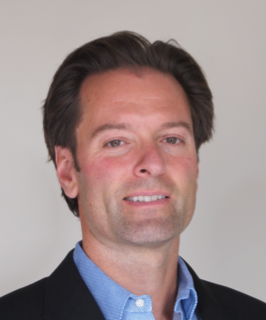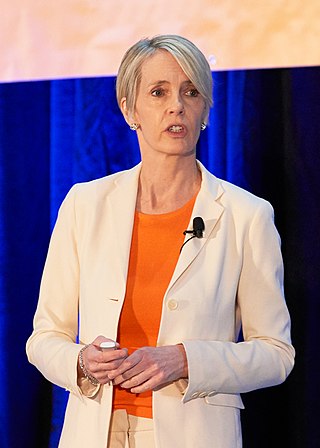Related Research Articles

Neurology is the branch of medicine dealing with the diagnosis and treatment of all categories of conditions and disease involving the nervous system, which comprises the brain, the spinal cord and the peripheral nerves. Neurological practice relies heavily on the field of neuroscience, the scientific study of the nervous system.

Neuroscience is the scientific study of the nervous system, its functions and disorders. It is a multidisciplinary science that combines physiology, anatomy, molecular biology, developmental biology, cytology, psychology, physics, computer science, chemistry, medicine, statistics, and mathematical modeling to understand the fundamental and emergent properties of neurons, glia and neural circuits. The understanding of the biological basis of learning, memory, behavior, perception, and consciousness has been described by Eric Kandel as the "epic challenge" of the biological sciences.

Neurofeedback is a type of biofeedback that focuses on the neuronal activity of the brain. The training method is based on reward learning where a real-time feedback provided to the trainee is supposed to reinforce desired brain activity or inhibit unfavorable activity patterns.

A brain–computer interface (BCI), sometimes called a brain–machine interface (BMI) or smartbrain, is a direct communication pathway between the brain's electrical activity and an external device, most commonly a computer or robotic limb. BCIs are often directed at researching, mapping, assisting, augmenting, or repairing human cognitive or sensory-motor functions. They are often conceptualized as a human–machine interface that skips the intermediary component of the physical movement of body parts, although they also raise the possibility of the erasure of the discreteness of brain and machine. Implementations of BCIs range from non-invasive and partially invasive to invasive, based on how close electrodes get to brain tissue.
In philosophy and neuroscience, neuroethics is the study of both the ethics of neuroscience and the neuroscience of ethics. The ethics of neuroscience concerns the ethical, legal and social impact of neuroscience, including the ways in which neurotechnology can be used to predict or alter human behavior and "the implications of our mechanistic understanding of brain function for society... integrating neuroscientific knowledge with ethical and social thought".
Nielsen Holdings plc is an American information, data and market measurement firm. Nielsen operates in over 100 countries and employs approximately 44,000 people worldwide.
Neuromarketing is a commercial marketing communication field that applies neuropsychology to market research, studying consumers' sensorimotor, cognitive, and affective responses to marketing stimuli. The potential benefits to marketers include more efficient and effective marketing campaigns and strategies, fewer product and campaign failures, and ultimately the manipulation of the real needs and wants of people to suit the needs and wants of marketing interests.
Brain-reading or thought identification uses the responses of multiple voxels in the brain evoked by stimulus then detected by fMRI in order to decode the original stimulus. Advances in research have made this possible by using human neuroimaging to decode a person's conscious experience based on non-invasive measurements of an individual's brain activity. Brain reading studies differ in the type of decoding employed, the target, and the decoding algorithms employed.

Michael T. Ullman is an American neuroscientist whose main field of research is the relationship between language, memory and the brain. He is best known for his Declarative/Procedural model of language.

Electroencephalography (EEG) is a method to record an electrogram of the spontaneous electrical activity of the brain. The biosignals detected by EEG have been shown to represent the postsynaptic potentials of pyramidal neurons in the neocortex and allocortex. It is typically non-invasive, with the EEG electrodes placed along the scalp using the International 10–20 system, or variations of it. Electrocorticography, involving surgical placement of electrodes, is sometimes called "intracranial EEG". Clinical interpretation of EEG recordings is most often performed by visual inspection of the tracing or quantitative EEG analysis.
The Mischer Neuroscience Institute is a combined research and education effort between the Vivian L. Smith Department of Neurosurgery and the Department of Neurology at McGovern Medical School at UTHealth Houston and Memorial Hermann Hospital. Located in Houston, the Institute draws patients from around the world for specialized treatment of diseases of the brain and spine. It was the first center in Texas and one of only a few institutions in the country to fully integrate neurology, neurosurgery, neuroradiology, neuro-oncology, spine surgery, pain medicine and neurorehabilitation.
Arno Villringer is a Director at the Department of Neurology at the Max Planck Institute for Human Cognitive and Brain Sciences in Leipzig, Germany; Director of the Department of Cognitive Neurology at University of Leipzig Medical Center; and Academic Director of the Berlin School of Mind and Brain and the Mind&Brain Institute, Berlin. He holds a full professorship at University of Leipzig and an honorary professorship at Charité, Humboldt-Universität zu Berlin. From July 2022 to June 2025 he is the Chairperson of the Human Sciences Section of the Max Planck Society.
Neuromanagement uses cognitive neuroscience, among other life science fields, and technology to analyze economic and managerial issues. It focuses on exploring human brain activities and mental processes when people are faced with typical problems of economics and management. This research provides insight into human decision-making and other general social behavior. The main research areas include decision neuroscience, neuroeconomics, neuromarketing, neuro-industrial engineering, and neuro-information systems. Neuromanagement was first proposed in 2006 by Professor Qingguo Ma, the director of Neuromanagement Laboratory of Zhejiang University.

Carl D. Marci, is a physician, scientist, entrepreneur and author of the book, Rewired: Protecting Your Brain in the Digital Age. He is currently Chief Psychiatrist and Managing Director at OM1, a venture-backed health data company using artificial intelligence to improve patient outcomes. He is also a senior advisor to early stage health tech start-ups and a part-time psychiatrist within the Department of Psychiatry at Massachusetts General Hospital, and Assistant Professor of Psychiatry at Harvard Medical School.

Robert Thomas Knight is an American neurologist and Professor of Psychology and Neuroscience as well as Neurology and Neurosurgery. His work is focused on attention and memory, neuropsychology, physiology, and cognitive neuroscience. He is an Elected Fellow of the American Academy of Arts & Sciences.
Petra Ritter is a German neuroscientist and medical doctor at Charité in Berlin. Her field is computational neuroscience and her focus is developing brain simulations for individual people with neurological conditions, combining EEG and neuroimaging data.
Neuro-Information-Systems (NeuroIS) is a subfield of the information systems (IS) discipline, which relies on neuroscience and neurophysiological knowledge and tools to better understand the development, use, and impact of information and communication technologies. The field has been formally established at the International Conference on Information Systems (ICIS) in 2007.
Guy Cheron is a professor of neurophysiology and movement biomechanics. He works at the Faculty of Motor Science in the Université Libre de Bruxelles and is a professor of neuropsychology at the Faculty of Psychology and Education Sciences in the University of Mons. He is the co-founder of the spinoff Human Waves.

Caroline Winnett is the executive director of the Berkeley SkyDeck startup accelerator at the University of California, Berkeley. She is a serial entrepreneur, civic activist, angel investor, advisor and board member of several startups, and a frequent speaker on startups, accelerators, women in business and consumer neuroscience.
Santosh Kesari is an Indian-American neuro-oncologist and neurologist who currently serves as the chair and Professor of the Department of Translational Neurosciences and Neurotherapeutics at the Saint John's Cancer Institute.
References
- 1 2 3 4 5 "This is your brain on neuromarketing". Archived from the original on 2023-06-15. Retrieved 2023-06-15.
- 1 2 3 4 "Nielsen Acquires NeuroFocus: Leading Neuromarketing Firm Becomes Part of Nielsen's Product Innovation Practice" (Press release). 26 May 2011. Archived from the original on 2023-06-15. Retrieved 2023-06-15.
- 1 2 "A Nielsen Acquisition Focused on Brain Waves". 26 May 2011. Archived from the original on 2023-06-15. Retrieved 2023-06-15.
- ↑ "$22 Million Neuromarketing Technologies Market: Global Report 2015-2020 - Research and Markets" (Press release). 11 July 2016. Archived from the original on 2023-06-15. Retrieved 2023-06-15.
- ↑ Lawton, Graham. "Innovation: Market research wants to open your skull". New Scientist. Retrieved 2023-06-18.
- ↑ "Professor Robert Thomas Knight". Archived from the original on 2023-06-15. Retrieved 2023-06-15.
- ↑ "An Interview with Skydeck's Caroline Winett MBA '90". 17 September 2018. Archived from the original on 2023-06-15. Retrieved 2023-06-15.
- ↑ Elliott, Stuart (30 March 2008). "Tapping the minds of consumers". The New York Times. Archived from the original on 2023-06-15. Retrieved 2023-06-15.
- ↑ "Nielsen to Acquire NeuroFocus". 20 May 2011. Archived from the original on 2023-06-15. Retrieved 2023-06-15.
- ↑ "NeuroFocus Acquires Neuroco, Expands Neuromarketing in UK". 31 July 2010. Archived from the original on 2023-06-15. Retrieved 2023-06-15.
- 1 2 "NeuroFocus Europe Limited". Archived from the original on 2023-06-15. Retrieved 2023-06-15.